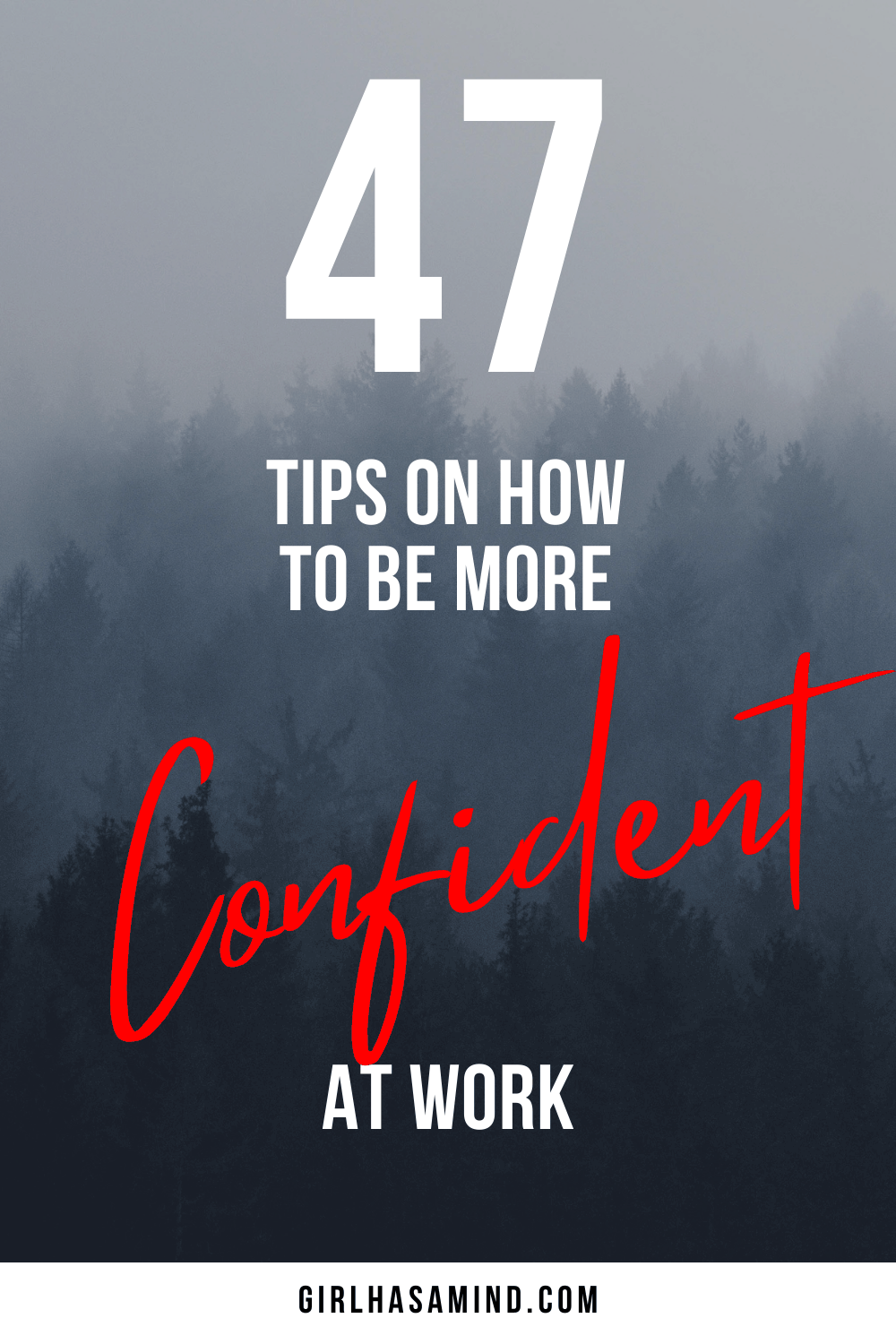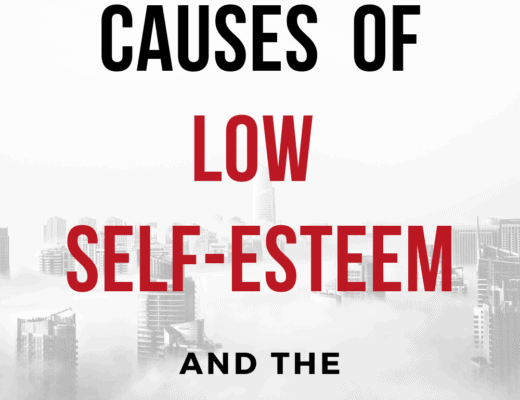Struggling at work? Afraid to speak out? Not sure you have what it takes? Learn 47 ways to be more confident at work.
Why Do I Lack Confidence At Work?
From imposter syndrome to being new and inexperienced, lacking confidence at work has many causes.
No-one is born with an abundance of confidence, it’s something we learn as we grow older and we put more achievement and experience under our belt.
Unfortunately, not only will it hold you back in your career, but it will lead to a lot of anxiety and unnecessary stress.
So building up your self-confidence at work is important, not only for career progression, but also for your mental health.
Check out my article “How To Build Confidence: 90 Easy and Actionable Tips to Boost your Confidence and Self-Esteem” to learn how to build up your self-confidence in all areas of your life.
How Do I Become More Confident At Work?
If you are wondering how to be more confident at work, below are 47 ways you can build your self-confidence for the workplace.
However, my favourite shortcut is, and will remain, achievement.
Nothing builds confidence like overcoming obstacles, completing a difficult task or project, persevering through hard times, learning new skills and pushing yourself outside your comfort zone.
Doing things where we are not entirely sure we can succeed, but finishing them anyway, really drives home the point that we are capable of more than we think.
When you start to believe in yourself, and you start to trust that you can do something, even if you don’t quite yet have the skills to do it, then your confidence kicks in and starts to build and grow.
Related Posts

47 Ways To Become More Confident At Work
1. Achieve more
Achieving things that you did not think possible is the number one way I have found to build self-confidence and self -esteem.
Especially if it’s extra scary, takes a long time to accomplish, and you had to learn a lot to complete it.
2. Build trust
Trust is the cornerstone of all relationships, even work relationships.
The more people trust you, the better your relationships will become.
This ultimately changes the dynamics you have with your stakeholders, your boss or your colleagues, and how they treat you.
When people trust you, they treat you differently, they show you more respect.
In turn, this will make you feel good about yourself and the value you bring to work, which in turn, will help you be more confident at work.
3. Ask more questions
Don’t be afraid to ask more questions in the workplace.
Some of the best advice I ever got was to ask as many questions as possible in the first 6 months of the job, because after that, everyone will expect you to know the answer.
4. Be curious
Don’t just accept things as they are. Try to figure out the how and the way, show interest and be curious.
5. Everyone makes mistakes
Everyone makes mistakes, even very intelligent, experienced, highly skilled and knowledgeable people.
You cannot learn without making mistakes. Not really. Until you’ve gone through it, your knowledge is mostly theoretical.
Imagine if Elon Musk gave up after his first space rocket blew up. Thanks to his perseverance, the human race has gained a lot of scientific knowledge on how to build rockets that can break free of the earth’s gravitational pull. He started a space race with at least 2 other competitors joining to become the first to blast into space.
So don’t be afraid of making a mistake.
6. No-one is perfect, definitely not you
Perfectionism is the enemy of done.
The funny thing is, that thing you did that you thought were so perfect…??? Well I’m sorry to have to tell you most people barely noticed, and when they did they thought it was average.
Only YOU see the perfection in your own work.
So you might as well stop, because you are spending a lot of time and effort on something no-one else notices, or cares about.
7. Go the extra mile
Going the extra mile at work will not only inspire respect and trust in others, but you will pride in what you are doing and what you have accomplished.
Being proud of your work is the first step toward self-confidence.
8. Ask for feedback
You cannot get better at anything without knowing what you are doing wrong.
Conversely, without feedback, how will you know what you are doing right?
A lot of people fear feedback and criticism because of a lack of confidence. They think if they do one thing wrong it will be this big disaster that will damage their careers, or that people will laugh at them or they might get fired.
The truth is, you are not perfect. You make mistakes, and you don’t have all the answers. But it’s OK, because everyone else is in the same boat.
So you can let go of this fear that to admit you are less than perfect will somehow have negative consequences for your career. It won’t. Trust me.
And once you can admit that you are less than perfect, it’s easy to listen to some feedback, good or bad.
As a caveat, choose who you ask for feedback from. Not everyone will have your best interest at heart, and some people simply do not have what it takes to give valuable and useful feedback.
Only ask people you trust and respect.

9. Become more confident in receiving criticism
You need to understand that some people love criticising others. They can’t help it.
But it doesn’t mean they are right, and it doesn’t mean you need to listen to them.
There will be a lot of people in life, and in the workplace, that will criticise you for the smallest nonsense. Let it wash over you.
Instead, take a moment to calmly assess whether it’s realistic or useful criticism or not. Is it your boss or some nobody from another team no-one ever listens to? Did you do something wrong, or did you do everything right and give it your best effort?
Assess the criticism from a practical standpoint, ask for advice from someone you trust and respect, then decide if it’s something you should be paying attention to or not.
10. Find a mentor
Most companies have some sort of mentorship scheme.
Mentors are a great way to help you deal with criticism, and they can help guide you through office politics.
11. Find allies that support you
My previous boss really cared about my career progression, without him as an ally, I would not have been promoted.
Allies are also great at singing your praises to their network of allies and stakeholders.
12. Join or build a group of supportive colleagues
Finding a like minded group where you can bounce ideas off each other, or talk through problems you might have.
It will make you feel less alone, but it will also give you an opportunity to ask questions or learn without fear of judgement or ridicule.
13. Go on professional development courses
Many companies run courses for their employees for career progression and satisfaction.
These can be technical courses, for example how to get more out of Excel or Outlook, or self development courses that teach you how to be an effective public speaker.
14. Learn how to be more assertive
Assertiveness is a tricky one, especially for women. I struggled with this for a very long time. Not because I was not assertive enough, but I was too assertive.
I suspect if I was a man, it would have been OK, but unfortunately, women who are too assertive are seen as aggressive or angry. I got a lot of comments and feedback to “be less angry”.
I had to go and learn how to speak in a certain way that was more palatable to other people.
15. Learn how to do public speaking
Let’s face it, some people are boring to listen to. Learning how to be more effective at public speaking will really boost your confidence and will help you feel more self-assured when you are standing in front of a group of people.
16. Learn how to run meetings effectively
Meetings can be an astonishing waste of time if not done right, which is also the reason so many people hate them.
Stick with the agenda, be firm and assertive, but make sure everyone has a voice.
17. Learn how to manage a team
Everyone can benefit from management training.
Because even if you are not, or don’t want to be a manager, you can still benefit from learning how to interact with a group of people to complete a common goal or project.
I am a manager, but managing my own team is the least of my problems, it’s managing co-workers outside my team that requires more skill, time and energy.
18. Learn how to manage your boss (manage upwards)
Having a good relationship with your boss is very important if you want to build confidence in your professional abilities.
Sometimes this also means managing expectations, or delegating upwards.
There are courses you can take that will help you with this, because if done wrong, it will break the trust you have in each other.
But if done right, it will greatly increase your level of confidence you have at work.
19. Learn about productivity
I’m not talking about breaking up your day into productivity chunks as recommended by the Pomodoro technique.
No, I’m talking about learning what is and isn’t important.
Not all tasks have equal importance or need to be done asap.
For example, the 80/20 rule suggests that 20% of your daily tasks contribute to 80% of the value you bring to your company.
Learning how to allocate your time and energy effectively is more important than learning how to colour code your inbox and exactly how many minutes at a time you can effectively concentrate.

20. Learn how to identify and manage your stakeholders
One of the more interesting courses I went on was stakeholder management.
Not everyone you interact with at work has the same value to the company or your career.
Learning who to give more energy and attention to is crucial for career success.
And the more success you have, the more you get noticed, and the more you will build your self-confidence.
21. Join charity initiatives at work
Meeting people while under the pressures of work deadlines changes how we behave and interact with others.
Charity work is a great way to get to know people in a casual and care-free setting. This makes it easier to become comfortable with your work colleagues, which will help you feel more confident next time you have to interact with them at work.
22. Dress for the job you want, not the job you have
Sounds cliché, but as with all clichés, it’s true.
Physical appearance does contribute to your own sense of confidence and esteem.
23. Learn to trust your inner voice
Or put another way, your gut.
Learning self-trust is crucial for self-confidence, because it will help us filter out the noise and criticism from those who do not care about us,
24. Celebrate your achievements
We sometimes forget what we have achieved. Making an effort to celebrate your wins will reaffirm to yourself that you are good at your job and that you do deserve that pay raise or promotion.
In my opinion, achievement remains the fastest path to self-confidence.
25. Stand up for yourself
Do not let anyone disrespect you or treat you like a doormat.
26. Learn to say no – the right way
Saying no is an art.
But if you never learn to say no, you will become a doormat.
Learning how to do it correctly without offending people or ruffling feathers is something that will benefit you not only in the workplace, but also in your own personal relationships.
27. Set healthy boundaries
When we don’t set healthy boundaries, we end up in situations that make us unhappy and miserable.
It’s hard to maintain your self-confidence or self-respect when that happens.
28. Speak out against injustice, inappropriate comments or behaviour, and discrimination
When you don’t, it can lead you to feelings of shame or guilt.
But when you do speak out, you will feel pride in yourself. And a sense of pride in yourself is a big step towards self-confidence.
29. Act and behave like you have been promoted to the next level
Fake it till you make it
Every corporate level seems to have it’s own set of subtle behaviour. Senior managers are more assertive than junior associates, who are more likely to cede power and control to those above them on the corporate ladder.
However, when you behave like you are already at the next corporate level, after a while it will start to become the norm and before you know it, the subtle behaviour, which at first might have felt forced and fake, will feel natural.
In other words, instead of building confidence one small step at a time, you fake it or force it, and after a while you will become used to this new way of confident behaviour, at which point, you have built confidence without really meaning it.
30. Overcome imposter syndrome
I wrote a whole article on imposter syndrome, you can read it here.
31. Identify your weaknesses and then work on them
While this is also true in general, it’s certainly very important in your professional life!
32. Identify your strengths and build on them
Finding things you are already good at and using them to build your career is a great way to build your confidence as it allows you to achieve more the easy way, with less stress and anxiety.
33. Upskill yourself
In today’s tech heavy world, there will always be a new thing to learn.
Go on courses that will give you all the skills you need not only for the job you have, but the job you want.
Besides, nothing kills confidence like being unsure about something, or getting an answer wrong.

34. Believe in yourself
We are all capable of far more than we think.
From personal experience, I know that those times in my life where I have been the most scared and overwhelmed, were also the greatest opportunities to learn and grow.
Afterwards I would always look back and be astonished at what I had accomplished, things I never dreamed I could do.
It has taught me something about self-believe. It has also made me realise I can probably accomplish far more than I think.
35. Watch your self-talk
Make sure the words you use when talking to yourself are positive. Constant self-criticism will crush your self-confidence, no matter how good you are at your job.
36. Run your own PR campaign
I don’t know about you but I am incredibly bad at telling people about my successes. I have colleagues and bosses who are always going on and on about what they’ve done, what they’ve achieved, how great a job they did, and that no-one else could have done it.
That level of self-promotion sticks in my throat. I hate having to do it.
Unfortunately, it is a skill you will have to learn if you want to build a successful career. Like learning how to do public speaking or make useful powerpoint presentations, being able to communicate to people your strengths and successes is what will set you apart from your peers.
Even if it doesn’t come naturally, you can still learn how to do it. Many companies run courses for their employees to help them build more successful careers, or be better in their current roles.
I still hate doing it, but I’ve learned at least enough to do it with some success when it comes to end of year reviews and promotions.
Also see point 11 – Finding allies.
37. Keep a list of achievements
Trying to remember what you have achieved at the end of the year is hard. All those great projects you worked so hard on, completed on time and were so proud of in April, are hard to recall come December.
So keep a list of all those achievements as the year goes on.
If someone emails you to say thank you, put that email in a special Achievements folder in your inbox.
That way at the end of the year, it’s pretty easy to look back and see what you’ve done so you can communicate that to your boss.
38. Confidence is a bell curve
Not every day will be easy. Some days will be hard. You’ll get knocked around by office politics, you will make mistakes, and you will doubt yourself.
That’s ok. Just remember that confidence is a bell curve. Hang in there and don’t let one bad day or week crush you.
39. Put yourself out there
Challenging yourself and pushing past your comfort zone by taking on work or projects that are just above your current level of skills or experience is a great way to build confidence through achievement (see point 1).
It will allow you to push your boundaries and grow, without things being too overwhelming.
40. Build resilience and grit
Having said that, there will be times when things will feel entirely impossible to complete or achieve, and extremely overwhelming.
The trick is to remember that life is like a wheel, sometimes you are at the top and sometimes you are at the bottom but the wheel is always turning.
In other words, everything comes to an end, even the bad times.
So hang in there, take it one step at a time, and remind yourself that this too shall pass.
Basically, sometimes you just have to embrace the suck (as they say in the army).
41. Work on your mindset
It’s hard to have self-confidence or self-esteem when your mindset is one of defeat and negativity. Changing your mindset to one where you believe you are capable of great things is important if you want to have a good life full of happiness and joy.
You can read more about mindset in this great article I wrote a while back.
42. Control your emotions
Being moody and emotional at work is a no-no. You need to learn to control your emotions.
Lashing out at people or being overly reactive to what other people say or do will break any trust you have with your boss, colleagues or stakeholders.
Plus you will spend far too much time and energy on the wrong things or situations.

43. Never send emails when you are angry or frustrated
Sending emails you regret will make you feel ashamed and it will kill your confidence.
- Read the email at least 5 times.
- Rewrite it at least 3 times.
- Reduce it to a 3rd of it’s length.
- Leave it overnight.
- Then if you still want to send it, send it.
44. Accept that not everyone will like you
Do you like everyone?
No?
Then accept that not everyone will like you.
45. Prioritize your own career
I used to be a team player that would just say yes to everything, until someone got promoted over me.
It was a real eye opener and I realised that it was time to prioritize my own career and what I wanted from my job and life.
This meant taking on only those projects that could increase my visibility, make use of my skill set, and basically make me look good to the RIGHT people.
It sounds selfish, but so what!
There will always be people who just want to show up at work, do their hours, and go home. Those other projects are perfect for them, allowing you to focus on being more strategic with your workload.
Having said that, working on projects that you care about, even for selfish reasons, will make you do a better job, which ultimately will benefit your team, your boss and your company.
Jonty Rhodes, one of the greatest South African cricket players ever used to say, “The better I do, the better the team does”.
46. Never lie
It sounds obvious yet I still see how a lot of people at work will lie to make themselves look good, or to get out of trouble.
Everyone knows when you lie. Honestly they do. If not immediately, it will become obvious later.
When you lie, you lose the trust others have placed in you and this will negatively impact not only your career and your reputation, but the respect you have for yourself.
47. Own your mistakes
Don’t downplay your mistakes. Own them.
Like lying, when you try to hide your mistakes, other people will notice, and it will impact the respect they have for you.
It’s really scary to admit a mistake, you may worry you will get fired, or be demoted, but the truth is owning and admitting mistakes is something that only really confident people do.
It’s something we intuitively recognize in others when they admit a mistake. We admire them for it.
So be the person who is confident enough to admit your mistakes, not because you are confident right now, but because it will force you to become more confident through the process itself.
How Can I Speak With Confidence?
Here are 3 great tips to speak with self-confidence that are practical and make a lot of sense.





